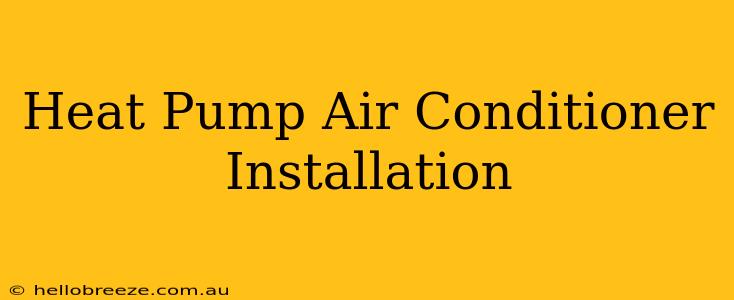Are you considering installing a heat pump air conditioner? This comprehensive guide will walk you through the entire process, from initial planning to final installation. Choosing the right system and ensuring a professional installation are crucial for maximizing efficiency and longevity.
Understanding Heat Pump Air Conditioners
Heat pump air conditioners offer a highly efficient solution for both heating and cooling your home. Unlike traditional systems, they don't generate heat; instead, they transfer heat from one area to another. This makes them significantly more energy-efficient than furnaces and standard air conditioners, leading to lower energy bills and a smaller carbon footprint.
Key Advantages of Heat Pump Installation:
- Energy Efficiency: Heat pumps are renowned for their energy efficiency, often achieving a Coefficient of Performance (COP) significantly higher than traditional systems.
- Cost Savings: Lower energy consumption translates to substantial long-term savings on your utility bills.
- Environmental Friendliness: Their reduced energy consumption contributes to a smaller carbon footprint, making them an eco-friendly choice.
- All-in-One System: A single unit handles both heating and cooling, simplifying your HVAC system and reducing maintenance needs.
Planning Your Heat Pump Air Conditioner Installation
Before contacting an installer, careful planning is essential. This includes:
1. Assessing Your Home's Needs:
- Size: Accurately determine the heating and cooling capacity required for your home's square footage. An improperly sized unit can be inefficient and ineffective.
- Climate: Consider your local climate and its impact on heating and cooling demands. This will influence the type of heat pump best suited for your needs.
- Energy Efficiency Ratings: Pay close attention to SEER (Seasonal Energy Efficiency Ratio) and HSPF (Heating Seasonal Performance Factor) ratings when comparing models. Higher ratings indicate greater efficiency.
2. Choosing the Right Heat Pump Type:
Several types of heat pumps exist, each with its own characteristics:
- Air-Source Heat Pumps: These are the most common type, transferring heat between the indoor and outdoor air.
- Ground-Source Heat Pumps (Geothermal): These utilize the stable temperature of the earth to provide heating and cooling. They are highly efficient but require significant upfront investment.
- Water-Source Heat Pumps: These use water as a heat source or sink, often connected to a well or body of water.
3. Finding a Qualified Installer:
Selecting a reputable and experienced HVAC installer is paramount. Look for:
- Licensing and Certification: Ensure the installer is properly licensed and certified to handle refrigerant and electrical work.
- Experience with Heat Pumps: Choose an installer with proven experience installing and servicing heat pumps.
- References and Reviews: Check online reviews and request references from previous clients.
The Heat Pump Installation Process
The installation process typically involves several steps:
1. Site Assessment:
The installer will assess your home to determine the optimal location for the outdoor unit and indoor components.
2. Electrical Work:
Proper electrical connections are crucial for safe and efficient operation. The installer will ensure sufficient power is available.
3. Ductwork Installation or Modification (if necessary):
Existing ductwork may need modification or replacement to accommodate the new system.
4. Refrigerant Lines:
Refrigerant lines connect the indoor and outdoor units and must be properly installed to prevent leaks.
5. System Testing and Commissioning:
After installation, a thorough testing and commissioning process ensures the system operates correctly and meets efficiency standards.
Post-Installation and Maintenance
After your heat pump is installed, regular maintenance is essential for optimal performance and longevity. This includes:
- Annual Inspections: Schedule annual inspections by a qualified technician to identify and address potential issues.
- Filter Changes: Regularly change or clean air filters to maintain airflow and efficiency.
Investing in a heat pump air conditioner is a significant decision, but the long-term benefits of energy efficiency, cost savings, and environmental responsibility make it a worthwhile investment. By following this guide and working with a qualified installer, you can ensure a smooth installation and years of comfortable and efficient climate control.

